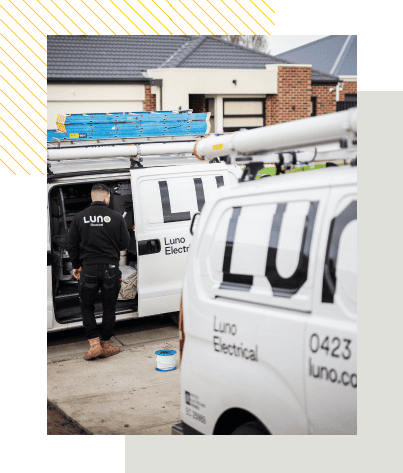Having a properly installed smoke alarm is essential for the safety of you and your family.
Read our guide to smoke alarm installation below so that this critical safety device is installed properly.

Having a properly installed smoke alarm is essential for the safety of you and your family.
Read our guide to smoke alarm installation below so that this critical safety device is installed properly.
Melbourne, with its vibrant laneways and coffee culture, is also a city that takes the safety of its residents seriously. One of the key aspects of home safety is the installation of smoke alarms, a crucial device that could mean the difference between life and death in the event of a fire.
In this comprehensive guide, we’ll walk you through the ins and outs of installing smoke alarms in your Melbourne home, detailing the safety standards and practices that will keep you compliant and, more importantly, safe. Of course, if you want to just get one installed asap we can give you a free quote fast.
In Australia, residential fire safety is governed by a stringent set of regulations and standards designed to provide maximum protection against the dangers of fire. Central to these regulations is the Australian Standard AS 3786, which specifies the requirements for smoke alarms used in houses, townhouses, residential units, and boarding houses.
Compliance with this standard is mandatory under the Victorian Smoke Alarm Legislation, ensuring that every home in Melbourne is equipped with a device that can alert residents at the first sign of fire.
The AS 3786 standard outlines the performance, testing, and maintenance requirements for smoke alarms. It requires that all smoke alarms:
Under Victorian legislation, it’s not just about having a smoke alarm installed; it’s about having the right kind of alarm, properly placed and maintained. It is a legal requirement that all Melbourne homes have a working smoke alarm on every level, preferably within bedrooms, and in hallways leading to sleeping areas. The alarms must be tested regularly and replaced periodically to ensure they remain in good working order.
When it comes to choosing smoke alarms, Melbourne homeowners have two main options: battery-operated and hardwired.
Battery-operated smoke alarms are popular for their ease of installation. They can be mounted on the ceiling without the need for any electrical work, making them a quick fix. However, they do require regular battery replacements, which can be an inconvenience. It’s crucial to ensure that the batteries are functional at all times, or else the alarm may fail in an emergency. If your home is built before August 1, 1997 your smoke alarms may be battery powered. If built or majorly renovated after then, they must be connected to mains supply – see the next paragraph.
Hardwired smoke alarms are connected to the home’s electrical system and often come with a backup battery. They are considered more reliable because they’re less likely to fail due to a dead battery. In Melbourne, new homes and homes undergoing significant renovations are required to have hardwired smoke alarms. These alarms can also be interconnected so that when one alarm sounds, they all do, providing an earlier warning and greater chance of safe evacuation. Homes constructed or undergoing a major renovation after 1st May 2014 are required to have interconnected alarms fitted.
The installation of smoke alarms in Melbourne homes should be carried out by a licensed electrician to ensure compliance with the Australian Standard AS 3786 and the Victorian Smoke Alarm Legislation. A professional electrician from Luno Electrical can provide expert advice on the best type and placement of alarms for your home, taking into consideration factors such as the layout of your home and the presence of any special requirements (get a free quote).
The placement of smoke alarms is crucial. They should be installed on the ceiling, away from walls and corners where dead air might prevent smoke from reaching the alarm. It’s advised to avoid placing alarms too close to kitchens or bathrooms as steam and cooking smoke can cause false alarms. Also consider proximity to major appliances like split system air conditioning units or major lighting installations. For Melbourne homes with multiple levels or larger layouts, additional alarms may be necessary to ensure that every part of the home is covered.
In larger homes or those with multiple floors, interconnected smoke alarm systems offer an added layer of safety. When one alarm detects smoke, all interconnected alarms throughout the house will sound. This system ensures that no matter where a fire starts, the alarm will be raised throughout the entire home, giving everyone the maximum time possible to evacuate.
The maintenance of smoke alarms is as important as their installation. It’s recommended that smoke alarms be tested monthly by pressing the test button. They should be kept clean and free from dust and cobwebs, which can interfere with their ability to detect smoke. Smoke Alarm Maintenance Services provided by professionals like us ensure that your alarms are always ready to perform when needed.
Smoke alarms have a limited lifespan and should be replaced every ten years, or sooner if they fail to respond to tests. Upgrading to newer models can provide better protection and features such as wireless interconnectivity or smart technology that can alert you to dangers even when you’re not home.
Regular smoke alarm compliance checks are essential to ensure that your Melbourne home meets all legal and safety requirements. These checks can be a part of our routine Smoke Alarm Compliance Checks service, ensuring that your home remains a safe haven for you and your family.
Smoke alarms are a critical element of home safety in Melbourne. By understanding and adhering to the Australian Standard AS 3786 and Victorian legislation, you can ensure your home is protected. Whether you opt for battery-operated or hardwired alarms (ensure you comply with the rules if you are renovating or building a new home), the key is to have them professionally installed, regularly maintained, and compliant with the latest standards. Don’t leave your safety to chance. Reach out to Luno Electrical for a consultation on smoke alarm installation and maintenance services, and rest easy knowing that your home is safeguarded against the threat of fire. Note: we also install smoke alarms for Commercial and Industrial businesses.
If you are looking for smoke alarm installation near me read our quick guide.
There are primarily two types of smoke alarms: battery-operated and hardwired. Battery-operated alarms are easy to install and maintain, while hardwired alarms are powered by your home's electrical system and often feature a battery backup for added reliability. You can also interconnect smoke alarms that are hard wired so that if one smoke alarm goes off, all interconnected smoke alarms in the house go off to ensure everyone is alerted to a fire.
It's recommended to test your smoke alarm at least once a month. This can be done by pressing the 'test' button on the unit. If it beeps weakly or not at all, it's time to replace the battery or the alarm itself.
Yes, it is a legal requirement in Melbourne and throughout Victoria to have working smoke alarms installed on every level of your home, in accordance with Victorian Government legislation and Australian Standards.
While you can install a battery-operated smoke alarm yourself, it's recommended to have a hardwired smoke alarm installed by a licensed electrician. This ensures that the installation is compliant with safety standards and regulations.
Check the packaging and product information of the smoke alarm to ensure it states compliance with AS 3786. You can also look for a certification mark or logo from a recognised body, such as Standards Australia. Luno Electrical only installs approved smoke alarms.
Photoelectric smoke alarms are generally more responsive to smoldering fires, which produce a lot of smoke. Ionization alarms are faster at detecting high-flame fires with less visible smoke. It's often recommended to have a combination or dual-sensor alarm that includes both technologies.
Maintain your smoke alarm by cleaning it regularly with a vacuum cleaner to remove dust and cobwebs, testing it monthly, replacing batteries annually (for battery-operated models), and replacing the entire unit every ten years or according to the manufacturer's recommendation.


